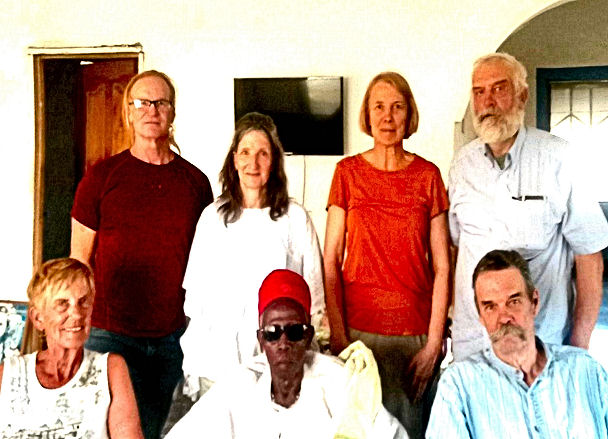Sellwood resident experiences Ghana with local nonprofit
Published 10:58 am Thursday, July 10, 2025

- Here’s the volunteer team for Yakote Women Farmers in January. From left, standing: Sean Rose, drip irrigation expert; Dr. Sally Wentross; Lisa Revell; and Tom DeMeo, farming consultant. Seated from left: Marilyn Schuster, YWF President; Kongo Chief; and Steven Irving. (Courtesy of Steven Irving)
Sellwood resident Steven Irving had never been to Africa, so when the opportunity arose to travel to Ghana in January of this year along with the Yakote Women Farmers (YWF), a nonprofit organization started eighteen years ago by Sellwood couple Lisa Revell and David Stone, he didn’t know what to expect.
Now it has been six months since returning, and he has had time to reflect on the experience. “My most significant impression was the general attitude of the people – who were kind, patient, and helpful, almost without fail. I was also struck by the tremendous amount of work ‘Yakote Women Farmers’ does in helping these Ghanaians to have better lives.”
When Revell and Stone founded YWF nearly two decades ago, they did not imagine that the work would continue so long, and would be so fulfilling. Each January since 2017 they have gone with a handful of volunteers to a few villages in Kongo – a dry savannah area in the Nabdam District of northern Ghana – where they offer support for nutrition, farming, and education, as well as health care for pregnant and anemic mothers.
Irving says he came away from the trip with a real sense of gratitude for the amenities and conditions of his own life here in Portland. He, Revell, and Ghanaian James Somtim rode borrowed motorcycles over very rutted roads to visit schools which had dangling shutters and inadequate roofs, due to insufficient funds for hardware and lumber. He used his own construction experience to help with plans for repair of floors, windows, roofs, and school desks, which will be done in the coming year with the help of YWF funds.
Northern Ghana is becoming increasingly dry, as the climate changes worldwide. Food inflation amounted to more than 30% in 2024, so the YWF efforts to provide food for malnourished toddlers and HIV patients, and to fund student lunches at four primary and junior high schools, are more necessary than ever.
A new volunteer worked with local farmers this year to create a demonstration garden, using drip irrigation. Food from that garden will be used at the Nutrition Center which YWF set up for malnourished children. And goats and pigs can get into gardens and farm areas, eating vegetables and crops, so YWF’s help with “fencing for farming” has been crucial in increasing food production.
Irving had a good time consulting with the Kongo Queen Mother – this designation is for an important figure in a village – about fencing for the pigs that YWF had provided for her last year. And, he told THE BEE that he pounded many nails for the remodel of a pig barn for the women’s farming cooperative headed by the Queen Mother.
An important part of the YWF program is providing scholarships, to make it possible for high school graduates to attend college. David Stone, administrator of the program with his counterpart Ghanaian Elliot Bawa, reports that since 2009 YWF college scholarships have provided life-changing opportunities for many students and their extended families. Currently 58 students are being supported, at a total annual expense of $36,000.
Revell and Stone recently downsized and moved out of Sellwood, but they are still nearby, and are still involved in many activities in Southeast Portland. They are always looking for volunteers with a background in farming, health care, education, or construction, who are willing to go to Ghana and serve with YWF. Volunteers pay for their own travel expenses, and in exchange receive unforgettable experiences in this West African country. If you are interested in discussing volunteering, email Lisa – lisak.revell@gmail.com.
“Yakote Women Farmers” is warmly welcomed each year by the villagers. Volunteers continue to accomplish a great deal, using funds received from individual donations, Rotary International grants, and matching funds from the employers of donors.
More information about volunteering and YWF projects and making donations can be found online – https://www.yakotewomenfarmers.org



